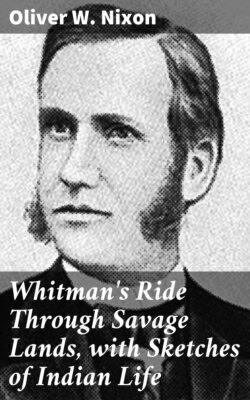Читать книгу Whitman's Ride Through Savage Lands, with Sketches of Indian Life - Oliver W. Nixon - Страница 7
На сайте Литреса книга снята с продажи.
CHAPTER III
ОглавлениеTable of Contents
The Effect of the Banquet Speech. How it Stirred Christian People. The American Board Acts. Drs. Parker and Whitman Go on a Voyage of Discovery. His Indian Boys. His Marriage and Journey through Savage Lands to Oregon.
The Indian oration at the St. Louis banquet was translated by a young man present, William Walker, who was an Indian chief, but a white man, and it was first published some months later in "The Christian Advocate" in New York, with a ringing editorial from its editor, Rev. Dr. Fiske, headed, "Who will Carry the Book of Life to the Indians of Oregon?"
The effect was electrical among religious people in the East. The Methodist Foreign Missionary Society were prompt to act, and the very next year sent two able-bodied, earnest Christian ministers, Jason and Daniel Lee, with one layman to aid them. They reached their field by the long, round-about waterway, via London and the Hawaiian Islands. For many years they did effective work, far up on the Willamette River. The American Board, then under the control of Congregational and Presbyterian churches, was more cautious. It was an unheard-of proposition to come from savage life so far away from civilization, and they wanted time to investigate. The Rev. Dr. Samuel Parker of Utica, New York, became restive under the delay, believing fully in the call of the Indians, and resolved to join some trading company to the Far West and go to Oregon. In 1834 he reached the border upon the Missouri, but the fur-traders had departed. He returned home and renewed his efforts to arouse the American Board to action. He found Marcus Whitman, M. D., as much of an enthusiast in the work as he, and the Board resolved to send the two men upon a voyage of discovery in 1835, and to have them return and report upon the possibility of establishing missions in that well-nigh unknown land. So in 1835, the minister and the young physician were on the western border in time to join a company of American fur-traders, bound for Green River, in what is now northern Utah. Upon reaching this point they met some two thousand Indians, representing various tribes living within five to seven hundred miles. There were large delegations of Oregon Indians to trade their furs for articles needed. When the object of the missionaries was explained to the Indians, they received the news with such enthusiasm as to dispel every doubt from the minds of the missionaries of the wisdom of their course and the Indians' sincerity in asking for Christian teachers. Upon consultation they agreed that it was wise to make no delay in reporting to the American Board. While Dr. Parker was to continue his journey to Oregon with the Indians, Dr. Whitman was to return with the convoy, make the report, and return the next year with reinforcements to begin mission work. The Indians showed such confidence in Dr. Whitman's promise to come to them after one more snow, that they selected two of their brightest, most intelligent, and muscular boys about eighteen years to accompany him, and help him on his way the coming year. Dr. Parker, with his Indian guides, reached Oregon, over which country he traveled extensively. He organized no mission, but studied the situation fully, so as to be able to make a wise report for the future guidance of the American Board.
Finding a ship sailing next year for the Hawaiian Islands he did not wait for Whitman and his company. Dr. Parker was a scholarly man and a keen observer, and upon his return wrote a book of great value. It was a true description of Indian life and conditions, the wealth of forest and the prospective finds of coal and minerals in the hills and mountains, the magnificence of rivers, the healthfulness and mildness of the climate. The book passed through six editions, and was interesting reading, but it was of a far-away land, and induced little or no immigration at that time.
